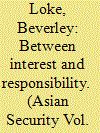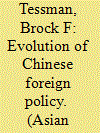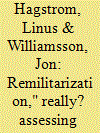| Srl | Item |
| 1 |
ID:
091578


|
|
|
|
|
| Publication |
2009.
|
| Summary/Abstract |
This article is situated within the contemporary debates about the nature and purpose of China's growing power. It uses the concepts of "national interest" and "international responsibility" as a framework of analysis for Chinese foreign policy, and develops a three-dimensional typology to conceptualize their relationship (antagonistic; instrumental; mutually constitutive). This article adopts two main arguments. First, a stronger China is one gravitating toward greater notions of international responsibility, albeit instrumentally. Second, observable trends in China's evolving worldview indicate, however, that it is conceiving its national interests more broadly, embracing further socialization and greater normative commitments to international society. One may therefore view China's burgeoning global role as a great power with a degree of "cautious optimism."
|
|
|
|
|
|
|
|
|
|
|
|
|
|
|
|
| 2 |
ID:
091585


|
|
|
|
|
| Publication |
2009.
|
| Summary/Abstract |
Rising powers such as the People's Republic of China (PRC) experience two distinct stages of relative capability growth. China is currently in the first stage of growth, which is defined by increasingly rapid expansion and incentives for foreign policy accommodation. As the PRC shifts to the second stage, however, relative growth will slow, and leaders in Beijing will be presented with new incentives for foreign policy confrontation. This article formalizes a two-stage model of relative power growth and argues that China's shift to the second stage of growth will threaten regional and global stability. During this shift, the key to international security will be a coordinated, multilateral effort that responsibly balances China's growing power with a similarly expanded international role for China.
|
|
|
|
|
|
|
|
|
|
|
|
|
|
|
|
| 3 |
ID:
091580


|
|
|
|
|
| Publication |
2009.
|
| Summary/Abstract |
As rising powers, India and China are critical to regional and global stability in the twenty-first century. While most analyses of their behavior emphasize their material capabilities as an explanatory variable, this article takes into greater account the role of the past. This involves how they both operate under a "post-imperial ideology" (PII), an emphasis on colonial trauma and "victimhood," exemplified in their still unresolved territorial dispute. Using new documents, this article shows how PII led to the breakdown of the negotiations between the two sides and war in 1962. PII not only suggests a new way to think about two important rising powers today, China and India, it also offers a new way to think about states in the international system.
|
|
|
|
|
|
|
|
|
|
|
|
|
|
|
|
| 4 |
ID:
091582


|
|
|
|
|
| Publication |
2009.
|
| Summary/Abstract |
This article analyzes Japanese foreign security policy and recent talk of "remilitarization." It does so by assessing the changes that most closely parallel the analytical interests of three sets of major international relations theories: namely capability (realism), policy (liberalism), and normative context (constructivism). Japanese responses to recurring North Korean missile tests moreover provide a source for a contextually bound analysis of policy and self-image. The article confirms that the last two decades have witnessed a number of important changes in security aspects of Japanese foreign policy but concludes that these changes are not nearly so dramatic as to justify the bold language of many Japan specialists. Hence, it serves to moderate the scholarly tendency to overemphasize or overly dramatize the changes in Japanese security policy.
|
|
|
|
|
|
|
|
|
|
|
|
|
|
|
|
| 5 |
ID:
091583


|
|
|
|
|
| Publication |
2009.
|
| Summary/Abstract |
This article examines the process through which India and the United States made their bilateral civilian nuclear energy cooperation pact a reality. Using the levels of analysis approach, this article examines the factors that were instrumental in shaping up the nuclear agreement as well as the negotiating process as it evolved in the United States and India with a special focus on how political leaderships in the two states managed domestic opposition to the pact. Subsequently, this article locates the US-India nuclear agreement in the context of the broader theoretical debate in international relations over the role of international institutions in global politics and argues that the successful conclusion of the agreement highlights the importance of strategic considerations in driving the nonproliferation priorities of great powers.
|
|
|
|
|
|
|
|
|
|
|
|
|
|
|
|